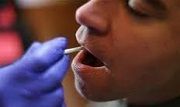Hepatitis C Saliva Tests May Show a False-Negative Result if HIV Is Also Present
Saliva tests for detecting anti–hepatitis C antibodies may not be as effective in patients who also have an HIV infection.
This article was originally published on the Specialty Pharmacy Times website.

Although simple and convenient, saliva tests for hepatitis C infection may not be the best option for determining infection status, particularly in patients who may have a concurrent HIV infection.
According to the results of a study appearing in the July 2013 edition of Journal of Clinical Virology, the tests are a passable option for screening at-risk populations for the virus; however, the increased chance for a false-negative result when a patient also has an HIV infection severely limits the tests’ efficacy.
“Hepatitis C oral fluid antibody detection methods have great compliance levels, low cost, and authorize sampling in any place, without highly qualified personnel,” the authors noted. “Yet, HCV antibodies saliva detection methods present insufficient performances for the general population … The relative lack of sensitivity in the HIV infected population found in the present work is, however, a serious limitation as many HIV-infected persons are also HCV infected.”
The researchers used a modified serological assay protocol and compared the results to participants’ HIV serological status, CD4 cell counts, HIV viral loads, and HCV replication status. Researchers included 30 patients with HCV but not HIV, 28 patients without HIV or HCV, 30 patients with both HCV and HIV, and 30 patients with HIV but without HCV. Researchers used the Salivette kit, a saliva testing kit manufactured by Sarstedt LTD, to obtain saliva samples.
In the HIV-negative groups of participants, the anti-HCV antibody tests had 90% and 100% sensitivity and specificity. In participants with an HIV infection, the tests registered 93% specificity, and 73% sensitivity.
“A recent study on HCV rapid screening assays presented also [sic] higher rates of false-negative results on HIV-positive patients,” the authors noted. “This decreased sensitivity in HIV-infected patients could be linked to a lower concentration of HCV-antibody oral fluids when compared to a non—HIV-infected control population … The observed sharp drop from 90 to 73.3% of salivary testing sensitivity in the HIV population is in accordance with the 2 previous observations.”
Click here to access the full-text version of this article on the Specialty Pharmacy Times website.